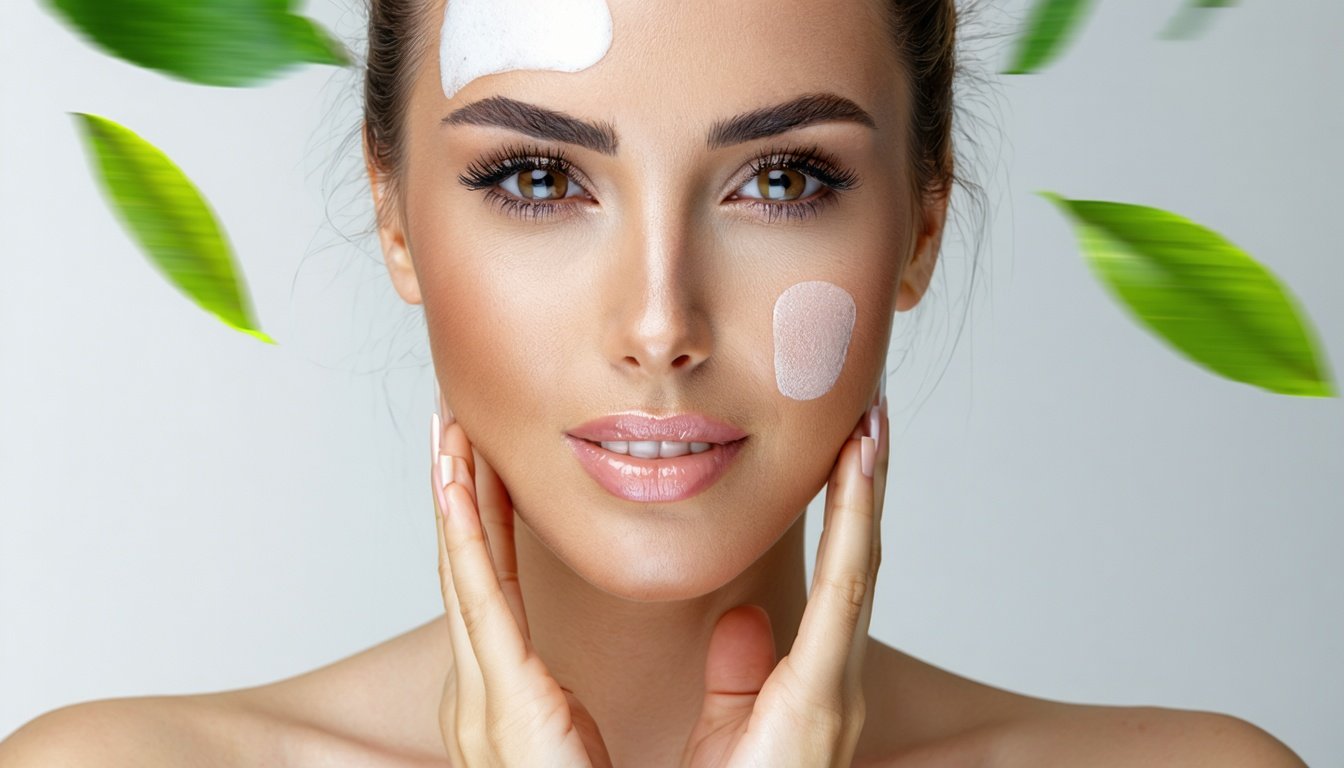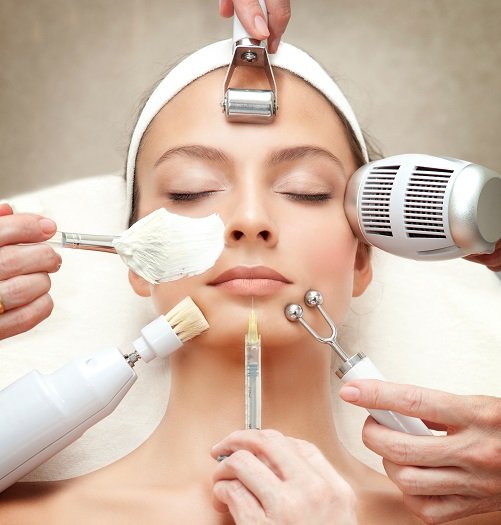Lifestyle Habits and Skin Hydration
Your everyday choices can make or break the moisture levels in your skin. Knowing how your skincare rituals and lifestyle decisions affect your skin can lead to better cosmetic results.
Impact of Skincare Routines
Skincare routines are the bread and butter of keeping your skin hydrated. Regularly washing, moisturizing, and using special treatments can seriously boost your skin’s moisture. A study called “Impact of Lifestyle on Differences in Skin Hydration of Selected Body Areas in Young Women” shows how certain skincare habits affect skin hydration in spots like the face, neck, and legs (MDPI).
| Skincare Routine | Impact on Hydration |
|---|---|
| Daily Cleansing | Clears out dirt, helping moisturizers soak in better |
| Regular Moisturizing | Seals in moisture, keeping dryness at bay |
| Targeted Treatments | Tackles specific skin issues, boosting overall hydration |
Sticking to a skincare routine that suits your skin type can lead to noticeable improvements in moisture and skin health.
Correlation with Skin Hydration
The link between lifestyle habits and skin hydration is key for getting the best look. The study points out that daily habits, like skincare routines, directly affect hydration levels in different body areas.
Things that help keep your skin hydrated include:
- Hydration Levels: Drinking enough water every day is a must for keeping your skin moist.
- Diet: Eating a balanced diet full of vitamins and antioxidants is great for skin health.
- Environmental Factors: Being out in harsh weather can suck the moisture right out of your skin.
By understanding how these lifestyle choices impact your skin, you can make smart decisions to boost your skincare routine. For more tips on getting ready for cosmetic treatments, check out our guide on preparing for a medspa treatment how to prepare for your first medspa treatment.
Adding these habits to your daily routine can lead to better skin hydration and overall aesthetic results.
Sun Protection and Skin Health
Effects of Sun Exposure
Soaking up the sun might feel great, but it can really mess with your skin. Over the years, all that sunshine can lead to wrinkles, those pesky age spots, and a bunch of other skin issues. The biggie, though, is the increased risk of skin cancer. That’s why keeping your skin safe from the sun is a must if you want to keep it looking and feeling good (Mayo Clinic).
Here’s a quick look at what too much sun can do to your skin:
| Sun’s Impact | What’s Happening |
|---|---|
| Wrinkles | Sun speeds up aging, making those lines show up sooner. |
| Age Spots | Extra sun can cause dark spots to pop up. |
| Skin Cancer | Too much UV exposure ups your chances of skin cancer. |
| Dryness | Sun can suck out moisture, leaving skin dry and flaky. |
Importance of Sunscreen
Sunscreen is your skin’s best buddy against those harmful UV rays. It acts like a shield, stopping UV radiation from getting through and causing trouble. Make sure you grab a broad-spectrum sunscreen with at least SPF 30 for the best defense.
Here’s the lowdown on why sunscreen is a game-changer:
- Everyday Essential: Slap on sunscreen daily, even if it’s cloudy or you’re inside, because UV rays can sneak through windows.
- Reapply Often: Put it on again every couple of hours, or more if you’re swimming or sweating.
- Match Your Skin: Pick a sunscreen that fits your skin type, whether it’s oily, dry, or sensitive. The right product will keep your skin happy (American Academy of Dermatology).
- Extra Protection: Pair sunscreen with other sun blockers like hats and chilling in the shade during peak sun times.
Making these sun-safe habits part of your daily routine is key for keeping your skin looking its best. For more on getting your skin ready for treatments, check out our guide on pre-treatment skincare routine.
Nutrition and Skin Aging
Role of Balanced Diet
What you eat can make a big difference in how your skin looks and feels. Munching on a mix of fruits, veggies, whole grains, and lean proteins can keep your skin looking fresh and youthful. But if you’re loading up on sugary snacks and refined carbs, you might be speeding up those pesky signs of aging (Mayo Clinic).
Adding foods packed with antioxidants to your meals can help fight off those sneaky free radicals that age your skin before its time. Check out this handy table for some skin-loving nutrients and where to find them:
| Nutrient | Sources | Benefits |
|---|---|---|
| Antioxidants | Fruits, veggies, green tea | Battle free radicals, ease inflammation |
| Collagen | Bone broth, citrus fruits, leafy greens | Keeps skin firm and smooth |
| Vitamin A | Sweet potatoes | Repairs skin damage, improves tone |
| Vitamin C | Citrus fruits | Boosts collagen, brightens skin |
| Vitamin E | Nuts | Shields skin from stress |
Hydration and Skin Elasticity
Keeping your skin hydrated is like giving it a big, refreshing drink. It helps your skin stay bouncy and smooth, making those fine lines and wrinkles less noticeable. Staying hydrated is especially key if you’re considering cosmetic treatments like Botox or fillers, as it can make them work better and last longer (Pure Medical Spa).
To keep your skin happy and hydrated, aim for at least 8 glasses of water a day. You can also snack on hydrating foods like cucumbers, watermelon, and oranges. Here’s a quick guide to staying hydrated:
| Tip | Description |
|---|---|
| Drink Water | Shoot for 8 glasses daily |
| Hydrating Foods | Eat fruits and veggies with lots of water |
| Limit Caffeine | Too much caffeine can dry you out |
| Monitor Urine Color | Light yellow means you’re well-hydrated |
By eating right and staying hydrated, you can give your skin the love it deserves. For more tips on getting ready for cosmetic treatments, check out our guide on preparing for a medspa treatment how to prepare for your first medspa treatment.
Stress Management for Healthy Skin
Keeping your stress in check is a big deal when it comes to having skin that looks and feels good. Too much stress can make your skin more sensitive and even cause problems like acne. Knowing how stress messes with your skin can help you make better choices for a glowing complexion.
Effects on Skin Sensitivity
Stress can really mess with how your skin reacts. When you’re stressed, your body pumps out hormones like cortisol, which can cause inflammation and make skin issues worse. This can lead to redness, irritation, and just plain discomfort. The Mayo Clinic says keeping stress in check is key to keeping your skin happy.
| Stress Level | Skin Sensitivity Impact |
|---|---|
| Low | Barely any sensitivity |
| Moderate | Some redness and irritation |
| High | Major sensitivity, possible flare-ups |
Acne and Stress
Stress is a well-known culprit for acne breakouts. When you’re stressed, your body cranks up oil production, which can clog pores and lead to acne. Plus, stress can mess with your sleep, which is bad news for your skin. Not getting enough shut-eye can mess with collagen production, which is super important for keeping your skin firm and elastic.
Finding ways to chill out can help keep acne at bay. Things like mindfulness, working out, and getting enough sleep can do wonders for your skin. The American Academy of Dermatology points out that stress can trigger flare-ups of many skin issues, including acne, eczema, and rosacea.
| Stress Management Technique | Benefits for Skin |
|---|---|
| Mindfulness | Calms inflammation and helps you relax |
| Regular Exercise | Boosts circulation and cuts down stress hormones |
| Adequate Sleep | Aids collagen production and skin repair |
Adding these stress-busting habits to your daily routine can lead to healthier skin and better cosmetic results. For more tips on getting your skin ready for treatments, check out our guide on pre-treatment skincare routine.
Sleep Quality and Skin Appearance
How well you sleep can make a big difference in how your skin looks and feels. Knowing how sleep helps your skin heal and what happens when you don’t get enough can guide you to better habits for a fresher face.
Skin Repair During Sleep
When you hit the hay, your body gets busy fixing and refreshing your skin. This magic happens mostly in the wee hours, as your body mends skin cells that took a beating from things like the sun. Catching enough Z’s can lead to a brighter face and bouncier skin.
| Sleep Duration | Skin Condition |
|---|---|
| 7-9 hours | Best skin repair, fewer wrinkles |
| 5-6 hours | More chance of dry skin, dull look |
| Less than 5 hours | More wrinkles, crow’s feet, and frown lines |
A study on Korean women in their 40s showed that even missing one night of sleep can mess with skin bounce and looks (Sleep Foundation). Getting enough shut-eye can keep you looking young and lively.
Effects of Sleep Deprivation
Not getting enough sleep can really mess with your skin and how you look. Lack of sleep is tied to more wrinkles and lines. People who don’t sleep enough often look sad and tired, which can change how others see them in terms of trust and character.
Here’s a quick look at how missing sleep affects your skin:
| Sleep Deprivation Level | Skin Effects |
|---|---|
| 1 night | Less skin bounce, more aging signs |
| 2-3 nights | Dull skin, more dryness, and peeling |
| 4+ nights | More visible aging, greasy hair, possible hair loss |
Plus, not sleeping well can boost stress hormones, which can mess with your hair, making it greasy or even fall out (Sleep Foundation).
To keep your skin looking its best, try to get better sleep. For more tips on getting ready for beauty treatments, check out our guide on what to do before cosmetic procedures.
Social Media and Body Image
Influence on Beauty Standards
Social media’s got a knack for messing with how we see beauty and body image. Platforms like Instagram and Facebook are like the cool kids at school, always flaunting a one-size-fits-all idea of what’s attractive. This endless parade of perfect pics can make you feel less than thrilled about your own looks. Studies show that the more you scroll, the more you might feel bummed about your body, with self-esteem taking a nosedive and anxiety about your appearance creeping up, especially if you’re a teen or young adult (PMC).
Social media’s like a funhouse mirror, twisting reality and making you compare yourself to others. You’re bombarded with polished snapshots of life that can warp your sense of what’s normal and attractive. This constant barrage of picture-perfect moments pushes you to stack your everyday life against the glossy lives of others, often leaving you feeling like you’re not measuring up.
| Impact of Social Media on Body Image | Effect |
|---|---|
| Feeling unhappy with your body | High |
| Self-esteem taking a hit | High |
| Worrying more about how you look | Moderate |
| Risk of eating disorders | Moderate |
Psychological Impact
The mind games social media plays with body image are no joke. Being flooded with these beauty ideals can mess with how you see yourself and shape your body image. Many folks, especially young adults, might find themselves battling mental health issues like low self-esteem, depression, and eating disorders because they’re constantly comparing themselves to these impossible standards (PMC).
To dodge the negative vibes social media can throw at your body image and mental health, it’s smart to have a game plan. This means getting savvy about media, using social media in a balanced way, and creating spaces that celebrate all kinds of bodies. By building a healthier relationship with social media, you can keep your mental health in check and feel better about your journey to looking and feeling good.
For more tips on getting ready for cosmetic treatments and keeping those results looking sharp, check out our articles on preparing for a medspa treatment how to prepare for your first medspa treatment and best practices for long-lasting results best practices to make your medspa results last longer.





















